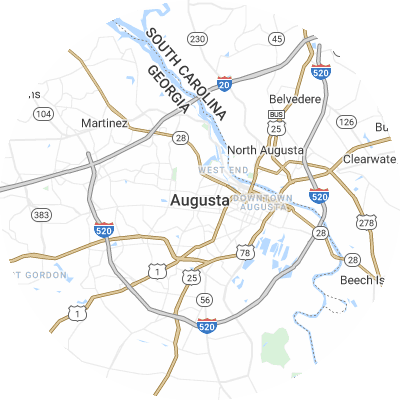Please enter a valid 5-digit zip code!
Written By David Cusick
Last Updated February 2024
A new solar energy system will provide you with a renewable power source that will eventually pay for itself. Solar power can reduce your energy costs and shrink your carbon footprint. However, it's important to select a reputable solar installer. That’s why we’ve reviewed the options and assembled a guide to the most reliable solar providers in Augusta. These top providers offer high-quality and reliable services.
Clear pricing policy
Reliable customer support
Free quotes
Services Offered
Reliable customer support
Informative resources
Clear pricing policy
Services Offered
Reliable customer support
Clear pricing policy
Informative resources
Free quotes
Services Offered
Informative resources
Clear pricing policy
Free quotes
Reliable customer support
Services Offered
Clear pricing policy
Reliable customer support
Prompt service delivery
Free quotes
Informative resources
Services Offered
Reliable customer support
Free quotes
Informative resources
Clear pricing policy
Services Offered
Clear pricing policy
Reliable customer support
Informative resources
Services Offered
Clear pricing policy
Reliable customer support
Informative resources
Free quotes
Services Offered
Reliable customer support
Clear pricing policy
Informative resources
Services Offered
Clear pricing policy
Informative resources
Reliable customer support
Free quotes
Services Offered
Today's Homeowner looks at dozens of datapoints on solar companies to come up with our data-driven rankings. It's not possible for a company to pay for preferential treatment in our rankings. We look at the following key factors in determining who should top our list:
Going solar can be a great way to save money on electricity costs and help the planet by reducing your carbon footprint using renewable energy. Here are some crucial factors to consider when deciding if a solar installer is reliable.
It's important to hire a licensed solar installer. This help guarantee that the work is done properly using the most up-to-date installation methods. Georgia doesn't have solar-specific contractors' licenses, but the law does require solar installers to be licensed electrical contractors. The Georgia Secretary of State manages licenses and business filings.
Check Google Reviews, the Better Business Bureau (BBB), TrustPilot, and other review sites to see what past customers have to say about local solar providers. Detailed reviews can help you evaluate a provider's integrity and customer service. Avoid providers with few or mainly poor reviews.
Call at least three solar companies for free, itemized quotes. These quotes should describe all costs and list the solar equipment included. Reviewing multiple quotes helps you find the best option that fits your budget.
Top-notch solar installations should have strong workmanship and performance guarantees. A workmanship warranty covers installation issues, such as poor wiring, cracks in the panels, or poor alignment. A performance guarantee ensures a minimum energy output. Comprehensive guarantees show that a solar company believes in its work.
Going solar can help decrease your energy expenses over time. Be sure to consider these aspects when judging the cost and value of solar panels.
Augusta homeowners typically spend about $17,058 on home solar systems after federal tax refunds. Solar arrays in Augusta cost roughly $3,740 per kilowatt, with the average residential solar system being 6.5 kilowatts. A personalized estimate from a local solar provider will include costs for permit fees, preliminary work, and labor, and will account for your system's size, capacity, and panel type. Some homeowners prefer to lease solar panels in order to reduce upfront costs.
Incentive Type: Sales Tax Incentive
Incentive Amount:
100% exemption
Incentive Amount:
Single Family
Central AC Replacement: $50
Air/Duct Sealing: $300
Attic Insulation: $250
Heat Recovery Water Heater with Heat Pump: $250
Heat Pump Water Heater: $250
Solar Water Heater: $250
Home Energy Assessment: $150
Smart Thermostat: $75
Heat Pump conversion: $250
Multifamily
Central AC Replacement: $25
Air/Duct Sealing: $150
Attic Insulation: $125
Heat Recovery Water Heater with Heat Pump: $250
Heat Pump Water Heater: $250
Solar Water Heater: $250
Home Energy Assessment: $75
Smart Thermostat: $38
Heat Pump conversion: $125
A solar photovoltaic (PV) system can generate power to run any electric appliance or system in your home. More specifically, you can install a solar water heating system.
There are a number of advantages of home solar energy. You can save money, raise your property values, and qualify for tax benefits. With the right storage equipment, solar panels can also give you further energy independence and offer some protection from power outages.
It depends on where you live and what type of panels you're installing. With the winter months in Georgia being very mild, you have significant leeway to install your panels, though they won't reach peak performance until summer arrives.
Absolutely. The grid in Augusta already uses a large share of renewable energy sources, and you may be able to sell your excess generated energy to your utility for additional cost savings.
You might be pleasantly surprised at how quickly you can get a return on investment from your solar panels. In perennially-sunny Augusta, you could make enough from your solar panels to recoup your investment in 11.8 years per 5 kW of rated capacity at maximum.
While solar energy might not be the best performing choice for some in wet or dark areas, the latest generation of equipment and energy storage systems could increase your property's solar viability enough to achieve a return on investment. A contractor could also recommend a different primary source of renewable energy like wind or geothermal to boost your generation.
The answer ultimately depends on your specific situation. You'll be eligible for a federal tax credit of up to 30% of the system's cost, as well as state or local incentives depending on where you are. As for insurance, you'll need to inform your insurance company about your new solar panels. Your premium may increase due to added property values, but you'll have peace of mind if a covered event happens to the system.
